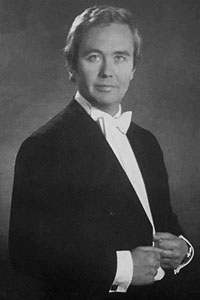The History of René Kollo

Born: 20 November 1937
German Tenor
We know from this survey, the detrimental effects, the two world wars had on the careers of many of our subjects.
Worst of all, perhaps, was the disappearance from western eyes and ears, of the singers of Eastern Europe.
The Iron Curtain had fallen on East Germany, Czechoslovakia, Poland, Bulgaria, Hungary, Romania, and Russia itself. And low gramophone records of the greatest of the Russian artists, began to filter through onto western turntables, during the 50s.
It was not until the mid-60s, that we got to know of other artists from the eastern bloc states.
I’m, therefore, going to devote this side of our cassette to the most notable tenors, born in eastern bloc countries, whose careers were affected by the political division of Europe.
Fortunately, most of them were eventually able to pursue careers in western countries, and appear in complete operas or recitals, issued by the major record companies.
From east Germany, came Rene Kollo, born in Berlin on the 20th of November 1937.
He had a successful career in light music before beginning seriously to study singing with El Sabrina in 1958.
He made his debut in 1965 at Brunswick and was engaged at Dusseldorf from 1967 to 1971.
At first, he sang lyric roles, such as Pinkerton, Eisenstein and Die Fledermaus, Titus in la Formazan di Tito, and the Steersman with which he made his promising Bayreuth debut, in 1969, appearing at Munich, Vienna, Berlin, and Hamburg, as well as Venice and Milan, he gradually took on, (possibly too early because of the shortage of dramatic tenors) a heavier repertory, including most of the Wagner roles, which he sang at Bayreuth and Salzburg.
In 1976, he made his Metropolitan debut as Lohengrin, his Covent Garden debut as Sigmund and sang Siegfried in the Bayreuth centenary ring.
His voice is essentially lyrical, he sings the lead tenor roles in Prince Igor, Eugene Onegin, Janifer, Arabella, and the Magic flute, which he sang in a new production at Salzburg in 1974.
I have chosen the part of the Rome Narration from Tannhauser, which he recorded for Decca in 1971, when he was 34.
Tannhauser tells of his pilgrimage to Rome, to seek pardon from the Pope, for his association with Venus, the Goddess of Love at her temple of love, the Venusberg.
On his knees, before His Holiness, he hears ‘if you have enjoyed such sinful delights, and inflamed your passions at the fires of hell, if you have sojourned in the Venusberg, then now, from henceforth you are eternally damned.
Rome Narration / Tannhauser / 1971 – René Kollo

The History as it was Recorded
Sydney Rhys Barker
